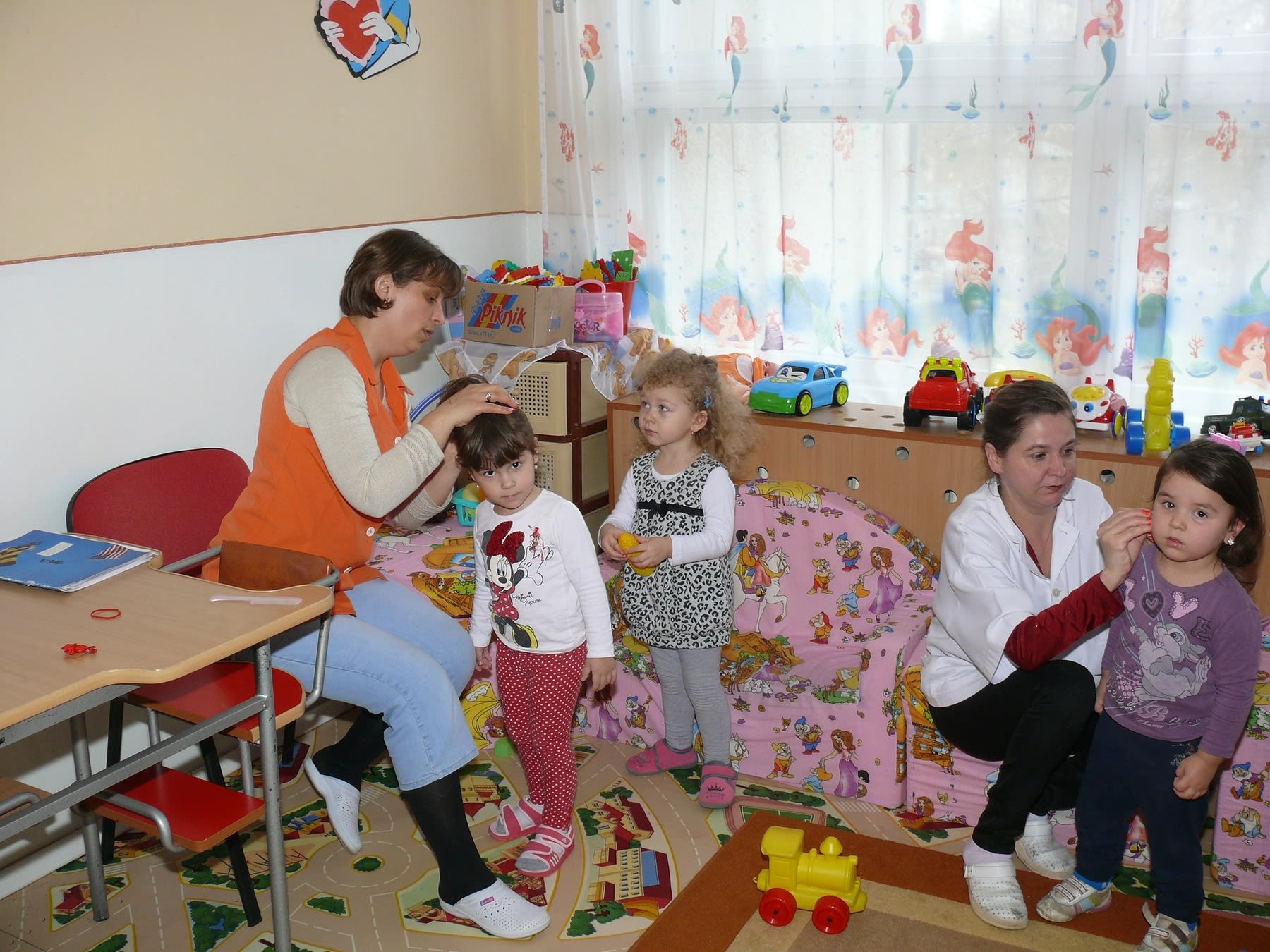What Can You Do with a Master’s in Early Childhood Education?

Key Takeaways
- A master’s degree in early childhood education can qualify graduates for advanced roles in education, from teaching to administration.
- Graduates with a master’s in early childhood education can work as an early preschool teacher, a childcare center director, special education teacher, or educational consultant, among others.
- Some early childhood education graduates specialize in early childhood policy and advocacy roles.
With growing demands for qualified specialists, a master’s in early childhood education is a must-have if you want a fulfilling and high-paying job. If you’re wondering, “What can you do with a master’s in early childhood education?“- you’re about to find out! Here’s an overview of the rewarding career paths that open up with this advanced degree.

Featured Programs
What Can You Do with a Master’s in Early Childhood Education?
With a master’s in early childhood education, you can pursue advanced roles in the field, from teaching to administration. You can become an early preschool teacher, childcare center director, or special education teacher. Additionally, you can work as an educational consultant or specialize in early childhood policy and advocacy roles.
This degree equips you with advanced knowledge and skills to impact young children’s learning and development. It prepares you for leadership positions in schools, daycare centers, and educational organizations. With expertise in early childhood education, you can shape educational practices and policies that benefit young learners.
| Job Title | Median Salary | Projected Job Openings (2022-2032) | Employment Growth (2022-2032) |
|---|---|---|---|
| Preschool Teacher | $37,130/year | 512,300 | +3% |
| Childcare Center Director | $54,290/year | 74,800 | -3% |
| Early Childhood Special Education Teacher | $65,910/year | 498,400 | +8% |
| School Psychologist | $91,990/year | 62,790 | +14% |
| Kindergarten and Elementary School Teacher | $63,670/year | 1,548,400 | +1% |
| Childcare Worker | $30,370/year | 945,900 | -2% |
Preschool Teacher
Preschool teachers have the important task of guiding children from three to five as they build foundational abilities in social and emotional regulation, language acquisition, and cognitive development. This encompasses learning the ins and outs of the classroom, developing social skills, and mastering the alphabet, numbers, shapes, sizes, and colors.
The job prospects for this role are expected to increase by 3% from 2022-2032.
- Median salary: $37,130 per year
- Work experience: None
- Number of jobs that will open (2022-2032): 512,300
Childcare Center Director
One of the most important administrative roles in daycare is that of the director. They take care of everything, from making educational plans to employing staff, organizing programs, ensuring compliance with state regulations and standards, and even feeding the kids in their care.
However, there will likely be a 3% drop in work opportunities for childcare facility directors between 2022 and 2032.
- Median salary: $54,290 per year
- Work experience: Less than five years
- Number of jobs that will open (2022-2032): 74,800
Early Childhood Special Education Teacher
One of the many possible careers for individuals with a background in preschool teaching is working with students with special needs. Since special education teachers work with kids with a variety of special needs, they need to make the curriculum more meaningful, accessible, and beneficial for children with many different disabilities.
The job prospects for special education teachers are expected to increase by about 8% between 2022-2032.
- Median salary: $65,910 per year
- Work experience: None
- Number of jobs that will open (2022-2032): 498,400
School Psychologist
A teacher with a background in early childhood education may be able to advance to school psychologist or guidance counselor role with additional training. School psychologists work in educational settings to help children manage behavioral issues, academic difficulties, and emotional challenges.
There will be a 14% increase in the number of jobs for school psychologists from 2018 to 2028.
- Median salary: $91,990 per year
- Work experience: Internship/Residency
- Number of jobs that will open (2022-2032): 62,790
Kindergarten And Elementary School Teacher
Kindergarten and elementary school teachers instruct children in basic subjects like math and reading, develop social skills, plan age-appropriate learning tasks, grade assignments, and assure a positive learning environment. They adapt to the varying educational needs of students as they grow and develop.
Jobs for primary and kindergarten teachers are expected to expand by around 1% in 2022-2032.
- Median salary: $63,670 per year
- Work experience: None
- Number of jobs that will open (2022-2032): 1,548,400
Childcare Worker
A person who works in childcare is responsible for meeting a child’s important needs when family members are not available. They also organize activities that stimulate physical, emotional, intellectual, and social growth. This could include jobs as a nanny, in a daycare, or in a program before or after school.
However, those with a master’s degree may’ve enhanced knowledge of child development and be qualified for higher-level positions in this field. A master’s degree can also reflect a commitment to the profession, which may yield increased responsibilities and pay opportunities. Childcare workers may expect a 2% decline in job openings in 2022-2032.
- Median salary: $30,370 per year
- Work experience: None
- Number of jobs that will open (2022-2032): 945,900

Back to Top
What is a master’s in early childhood education exactly?
A master’s in early childhood education is a graduate-level degree centered on effectively educating individuals to teach and nurture children from birth through eight years. The curriculum is designed to provide graduates with a deep understanding of child development, learning theories, and educational practices tailored for young learners.
Common Courses That Students Will Learn
During a master’s program in early childhood education, students engage in various courses that cover important topics in the field. Some of the key areas of study include:
- Child development: Insights into the physical, cognitive, and social growth patterns of children.
- Curriculum design: Techniques for creating instructive and engaging curricula suitable for early childhood.
- Assessment strategies: Evaluation methods to track and enhance children’s learning progress.
- Classroom management: Strategies to create a conducive learning environment for young children.
- Family and community engagement: Understanding the role of families and communities in a child’s early learning and development.
The coursework integrates both theoretical and practical approaches, often including hands-on experiences through student teaching, internships, or practicums. Students learn to implement best practices in early childhood settings, design engaging activities for young learners, and support each child’s needs.
Back to TopWhy pursue a master’s in early childhood education program?
A master’s in early childhood education allows educators to specialize in practices for young children. It empowers them with a deep understanding of child development and the ability to apply advanced educational theories in the classroom. This degree prepares them for influential roles in early childhood education.
Let’s explore three key benefits of this degree.
Increased Job Satisfaction
Giving children chances to learn and develop is a main objective of early childhood education professionals. Numerous professionals in the industry work with exceptional education children, traumatized children, and children for whom English is a second language.
Providing a good academic atmosphere for these kids can give these educators a stronger feeling of purpose. These individuals can also help kids in one or more school districts do better in school by being policymakers, school administrators, or program directors. This kind of broad impact on the lives of young pupils can raise job satisfaction.
Growing Need For Educators
The hiring need for teachers is expected to rise as the population grows. This will give individuals with master’s degrees in early childhood education more opportunities.
Schools also emphasize the value of early childhood education through focused programs and customized lesson plans. This increased need for more meaningful education means that teachers holding this master’s degree could have a better career future.
Higher Income Potential
Teachers with a master’s degree may be able to make more money. For instance, a principal, who usually holds a master’s degree, earns a national average of $78,181 annually. On the other hand, preschool instructors without an advanced degree, make an average of $40,020.
Even when early childhood education specialists are not interested in administration, holding advanced degrees could increase their chances of landing well-paying jobs.
Back to TopAdmission Requirements for a Master’s in Early Childhood Education
Though each institution has its own specific admission requirements for a master’s in early childhood education, generally speaking, you should expect to fulfill the following requirements:
- Degree and CGPA: Applicants typically must hold a bachelor’s degree from an accredited institution. Many programs seek candidates with a minimum cumulative GPA (CGPA) of around 3.0 on a 4.0 scale.
- Official transcript: Candidates must submit an official transcript from their undergraduate institution. This transcript will display the courses taken and grades achieved, which helps admissions committees evaluate an applicant’s scholarly potential.
- Essay or writing sample: Some programs may ask for an essay or writing sample. This is to assess an applicant’s critical thinking, writing skills, and suitability for a graduate program in early childhood education.
- Statement of purpose: A well-crafted statement of purpose should articulate the applicant’s motivations for pursuing a master’s in early childhood education, their professional goals, and how the program aligns with their aspirations.
- Letters of recommendation: Some institutes require prospective students to submit two to three letters of recommendation. These letters should preferably come from academic advisors or professional supervisors who can attest to the candidate’s abilities and qualifications.
- Admission interview: Some institutions conduct admission interviews as part of their selection process. The interview can gauge an applicant’s commitment and compatibility with the program’s values and objectives.

Back to Top
Best Accredited Master’s In Early Childhood Education Degree Programs
Now you’re wondering which programs you should apply for. Of course, you’d want to go only for the best. This is why we have created a list of three notable institutions offering accredited master’s in early childhood education degree programs.
Each of these programs offers a unique set of courses and experiences designed to prepare graduates for various roles in the field.
- #3 Best Research Universities in Arizona 2026 #3 Best Colleges in Arizona 2025 #3 Most Affordable Colleges in Arizona 2025 #3 Best Public Colleges in Arizona 2024
Tuition + fees
$12K
Acceptance
80%
Graduation
59%
Student body
32K
Career Outlook for Early Childhood Education degree at Northern Arizona University
Cost of Degree: $12,547Expenses: $17,028Starting Salary: $49,054Salary after 4 years: $49,426Cost Recoup Time: 7 yearsPaid back at 15% of annual salary- Estimated cost per credit: $610
- Accreditation: National Association for the Education of Young Children (NAEYC)
- Required credits to graduate: 30-37 credits
Northern Arizona University offers a master of education (MEd) in early childhood education. The curriculum focuses on the developmental needs of young children and early childhood educational practices. This program is ideal for those wishing to advance their skills in working with young children from birth through age eight.
Through comprehensive coursework, students engage with subjects including childhood literacy, educational research, and curriculum development. These subjects are designed to equip them with the skills needed to enhance their teaching strategies.
Northern Arizona University’s Online Degrees
BAS in Applied Science
Degree Concentrations
- Administration
- Emergency Management
- Logistics and Supply Chain Management
- Public Administration
- Required Credits: 120
- Completion Time: None Reported
- Format: Online
Bachelor of Science in Education in Career and Technical Education
Degree Concentrations
- Business and Marketing
- Education and Training
- Family and Consumer Science
- Health Careers
- Industrial and Emerging Technologies
- Occupational
- Required Credits: 120
- Completion Time: None Reported
- Format: Online
BS in Dental Hygiene
- Required Credits: 120
- Completion Time: None Reported
- Format: Online
BS in Computer Information Technology
- Required Credits: 120
- Completion Time: None Reported
- Format: Online
BS in Health Sciences
Degree Concentrations
- Diagnostic Medical Imaging and Therapy
- General Allied Health
- Medical Assisting
- Paramedic Care
- Physical Therapist Assisting
- Respiratory Care
- Surgical Technology
- Public Health
- Required Credits: 120
- Completion Time: None Reported
- Format: Online
BS/BA in Communication Sciences and Disorders
Degree Concentrations
- Communication General
- Organizational Communication
- Required Credits: 120
- Completion Time: None Reported
- Format: Online
BS in Hotel and Restaurant Management
- Required Credits: 120
- Completion Time: None Reported
- Format: Online
BBA in Business Administration
Degree Concentrations
- Entrepreneurship and Small Business
- Global Business
- Human Resource Management
- Logistics and Supply Chain Management
- Management
- Marketing
- Required Credits: 120
- Completion Time: None Reported
- Format: Online
BA in Interdisciplinary Studies
Degree Concentrations
- Administration
- Early Childhood
- Technology Management
- Humanities
- Public Administration
- Technology Management
- University Studies
- Emergency Management
- Industrial Leadership
- Technology Management
- Justice Studies: Intelligence Studies
- Criminal Justice Administration
- Required Credits: 120
- Completion Time: None Reported
- Format: Online
BS in Psychology
- Required Credits: 120
- Completion Time: None Reported
- Format: Online
BS/BA in Management
Degree Concentrations
- Health Care
- Entrepreneurship and Business Development
- Human Resource
- Required Credits: 120
- Completion Time: None Reported
- Format: Online
BS in Nursing
- Required Credits: 120
- Completion Time: None Reported
- Format: Online
BS in Parks and Recreation Management
Degree Concentrations
- Community
- Commercial and Tourism
- Outdoor Education and Leadership
- Park Protection
- Required Credits: 120
- Completion Time: None Reported
- Format: Online
BA in Public Administration
- Required Credits: 120
- Completion Time: None Reported
- Format: Online
BSW in Social Work
- Required Credits: 120
- Completion Time: None Reported
- Format: Online
- #25 50 Best Christian Colleges and Universities 2024 #1 Best Christian Colleges in Ohio 2025 #5 Best Private Colleges in Ohio 2024 #10 Best Research Universities in Ohio 2024
Tuition + fees
$46K
Acceptance
74%
Graduation
81%
Student body
13K
Median SAT/ACT
1260/27
Career Outlook for Early Childhood Education degree at University of Dayton
Cost of Degree: $19,040Expenses: $19,665Starting Salary: $66,983Salary after 4 years: $67,544Cost Recoup Time: 7 yearsPaid back at 15% of annual salary- Estimated cost per credit: $1,405
- Accreditation: Council for the Accreditation of Educator Preparation (CAEP)
- Required credits to graduate: 30 credits
The University of Dayton’s Master of Science in Education (MSE) in Early Childhood Leadership and Advocacy is designed to prepare graduates for leadership roles in the early childhood field. The program takes a comprehensive approach, focusing on the skills needed for effective advocacy and leadership within early childhood education settings.
Courses cover various topics, such as education law, policy development, and program administration. The program typically spans two years and is designed to provide students with the proficiencies needed to assume leadership positions and shape the future of early childhood education policy and practice.
Tuition + fees
$11K
Acceptance
88%
Graduation
59%
Student body
7K
Median SAT/ACT
1117/25
Career Outlook for Early Childhood Education degree at Worcester State University
Cost of Degree: $6,093Expenses: $16,259Starting Salary: $57,633Salary after 4 years: $58,070Cost Recoup Time: 5 yearsPaid back at 15% of annual salary- Estimated cost per credit: $365
- Accreditation: Commission on Institutions of Higher Education of the New England Commission of Higher Education
- Required credits to graduate: 34-39 credits
Worcester State University’s master’s in early childhood education program is structured to impart advanced knowledge and methods to educators that support the learning and development of young children. The program can be attended on a part-time or full-time basis, giving students flexibility in their studies.
With a curriculum that includes instruction in special education, literacy, and curriculum planning, students gain a well-rounded education impactful in the classroom. Graduates are prepared to fill roles as educators, curriculum specialists, or lead teachers in early childhood settings, supported by a solid foundation in educational theory and practical application.

Related Questions
Is a Master’s in Education the Same as a Master’s in Teaching?
They aren’t the same. A master’s in education typically encompasses a broader understanding of educational practices, including leadership, policy, and research. In contrast, a master’s in teaching is more focused on classroom teaching techniques and pedagogy.
How to Become an Early Childhood Education Teacher?
To qualify as an early childhood education teacher, an individual must obtain a relevant degree, typically a bachelor’s in education or early childhood education. Subsequently, they need to secure a teaching license specific to their state’s requirements.
How Much Do Master’s in Early Childhood Education Graduates Earn?
Earning potential is enhanced with a master’s degree in early childhood education. According to the U.S. Bureau of Labor Statistics, those holding a master’s degree in this field can earn up to 43% more than their counterparts with a bachelor’s degree, particularly in roles like preschool and kindergarten teaching.
Conclusion
Graduates with a master’s in early childhood education possess advanced skills to foster young learners’ development. They can pursue careers in curriculum design, educational policy advocacy, and leadership roles, enabling them to make significant contributions to the field of education.